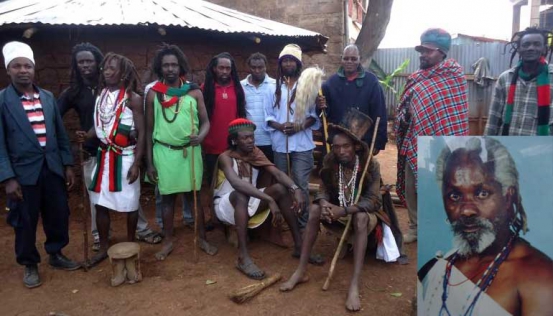
Thaai religious sect followers don’t conform to teachings of the Bible.
Their beef is that the Good Book talks about the one almighty God, but then again states that Jesus Christ is also God.
Thaai members, who practice polygamy and bar uncircumcised women from their rituals, do not swear using the Bible and instead raise their right arms in courts of law.
The sect’s rituals are conducted while facing Mount Kenya, the mythological home of the Kikuyu God.
Thaai sect leader Njenga wa Manyara claims, the Bible propagates Jewish traditions which are adhered to by African Christians who in turn discard their African traditions which are not inferior to those of the Jews.
“Why do foreigners insist on forcing Jewish practices on us?” poses Manyara. “We had our ways and they had theirs. We stick with ours and they stick with theirs.”
Manyara wonders why “in school, we were told that Jesus was a man, son of Joseph and Mary, but in churches, clergymen say he was God.” He adds that, “I don’t see why one would need a mediator to reach God yet he is directly accessible.”
He challenges Christians thus: “In the Bible, the same Jesus told them he did not come to get rid of their traditions but to strengthen them. Why do Christians fight our values when the Bible seems to value them?”
The Thaai sect, that borrows much from Kikuyu traditions, was founded by the late Ngonya wa Gakonya when he became disillusioned with Christianity in the late 1980s.
It was started as Tent of the Living God in Nairobi’s Kariokor area, before relocating to Ngando along Ngong Road in Nairobi. Ngonya died at the age of 50 in 1996.
Ng’ang’a wa Guchu, also a leader, says their fraternity does not conform to written rules or teachings, but they have procedures for each ritual. The sacrifices are heralded by visions from members.
“We do as our ancestors used to do decades ago. We praise and at times offer sacrifices when we want to beseech our God. When one of us gets a vision, we interpret it and then conduct rituals accordingly,” explains Guchu, adding that “sacrifices are offered by selected members who must abstain from sex for some days before the ceremony.”
Guchu further explains that whenever a member dies, the cause of death is laid bare during burial as “we don’t sugarcoat his or her eulogy. We say it as it is.”
Manyara reveals that decades ago, every community had ways of communicating with God and he responded to their prayers. “Why did we fall for a doctrine that eroded our culture and forgot the God we prayed to and answered our prayers? We don’t know much about the Bible, but sometimes we feel it is disrespected by its followers or lacks the purpose it was intended for,” he says.
Ndung’u Mwaniki, a member of the sect, argues that the Bible has become a popular novel. “Why do they use it to swear in courts and publicly only to dishonor that oath? For us, we don’t joke with a covenant that we make with our God,” says Mwaniki.
 The Standard Group Plc is a multi-media organization with investments in media
platforms spanning newspaper print
operations, television, radio broadcasting, digital and online services. The
Standard Group is recognized as a
leading multi-media house in Kenya with a key influence in matters of national and
international interest.
The Standard Group Plc is a multi-media organization with investments in media
platforms spanning newspaper print
operations, television, radio broadcasting, digital and online services. The
Standard Group is recognized as a
leading multi-media house in Kenya with a key influence in matters of national and
international interest.
